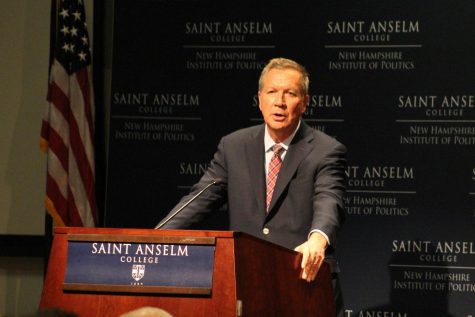Title IX and ‘Dear Colleague’ letter impact Saint Anselm’s response to sexual assault
March 29, 2017
Over the past few previous issues The Crier has been investigating the college in terms of its policies on sexual harassment and sexual assault. In the article “On-campus programs strive to prevent sexual assault,” which was published in The Crier’s Feb. 24 issue, discussed how Saint Anselm uses their policies and programs to prevent sexual assault. Now, The Crier analyzes how Saint Anselm deals with sexual harassment when it does occur and how the Title IX and “Dear Colleague” letter have helped adapt the college’s methods of response.
There are multiple forms, brochures, and above all support on campus for anyone involved at any level with a case of sexual assault.
Vice President for Human Resources and Title IX Coordinator Patricia R. Shuster, told The Crier “The first thing to do is to make sure they are safe.” Dean of Students Alicia Finn elaborated on the process while handing out another brochure “Victims are offered advocates of support on and off campus. The next step is to offer them medical, emotional, and psychological support.” Prevention is one of the key ways to stop sexual misconduct from happening and furthering its perversions deeper into this culture. “Prevention is focused on creating and supporting a culture where this is not as frequent.”
Title IX is a civil rights amendment that states “No person in the United States shall, on the basis of sex, be excluded from participation in, be denied the benefits of, or be subjected to discrimination under any education program or activity receiving Federal financial assistance.” The Dear Colleague Letter was issued by the Office of Civil Rights to all colleges who receive federal funding to improve their standards on sexual harassment.
In regards to the Title IX and the Dear Colleague Letter, Saint Anselm already had very progressive and expansive policies in place regarding sexual assault.“We review our harassment policy, where you will find the Title IX policy, every year we read and revise it as needed according to any new updates,” said Shuster.
All the policies regarding sexual misconduct are found in each handbook for the entire institution. Students, faculty, and staff all have the entire policy of how each member of the community should act responsibly. Some of the mandates for Title IX and the Dear Colleague Letter are the named Title IX Coordinator, annual training, level of evidence needed, prevention, and the equal treatment of respondent and complainant.
The mandate to do training was never really an issue for Saint Anselm, as they already offered programs to deal with situations of sexual assault. Even now, Saint Anselm provides training for students, faculty, administrators, resident assistants, orientation leaders, investigators, and the people who serve on the Review Board. This sort of training is required and reviewed by the college every year.
The Dear Colleague Letter also mandates that decisions are based on the preponderance of evidence universally. This means that there needs to be more than 50% of the evidence pointing to the conclusion. A decision is made by the Conduct Review Panel, different from the Judicial Board, based on testimony must be gathered from witnesses, investigation of facts, and meetings held with complainants and respondents to ask questions.
In addition, The Dear Colleague Letter also requires colleges to treat complainants and respondents equally and fairly. “If you do it for one, then you do it for the other,” said Finn. Both parties are allowed to appeal the decision made by Review Board just once, in which case the Title IX Coordinator, Patricia Shuster, must make the final decision.
Finn and Shuster told The Crier that there are some common misconceptions about how sexual harassment is handled by the college.
“When reporting to the police, one of the big myths that people come in with is that [they] have to go through the courts, but that isn’t true because you can file under Jane Doe, or John Doe, where the statement and evidence will be kept just in case you are ready to press charges,” said Finn.
Shuster added “Sexual assault, sexual harassment does happen, but it is fair to say that it is far from the norm. We are going to continue to educate for purposes of prevention.”










